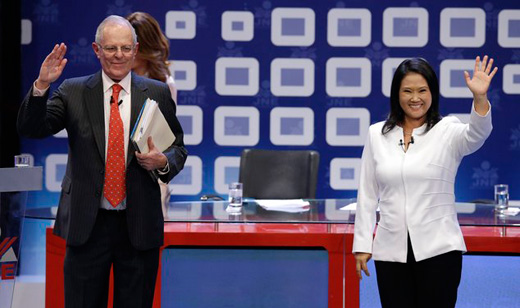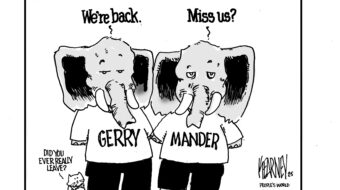
Official results have not been certified yet, but it appears that Pedro Pablo Kuczynski of the Peruvians for Change party has beaten Keiko Fujimori of the People’s Force in the June 5 presidential runoff election in Peru, but by the thinnest of margins. If these results are not reversed as vote totals from Peruvian expatriates come in, Kuczynski will have to figure out how to govern, and the Peruvian left will have to figure out how to operate under his right wing, corporate oriented administration.
In the first round, held on April 10, Kuczynski narrowly edged out Veronika Mendoza of the Broad Front, (Frente Amplio), a left alliance which includes both of Peru’s communist parties, the Communist Party of Peru-Red Fatherland and the Peruvian Communist Party. A Fujimori-Mendoza runoff would have provided a sharp ideological contrast, but as it turned out, the Peruvian left had to decide whether to sit out or to push a vote for one of the two right wing candidates.
Kuczynski, a banker with strong ties to international finance capital, and a former functionary of both the World Bank and the International Monetary Fund, was prime minister of Peru under President Alejandro Toledo (Peru has both a president and a prime minister) from 2005 to 2006 and had served previously as the country’s finance minister and, before that, Minister of Mines. He will certainly govern in the interests of international and Peruvian capitalist interests. This will bring him into sharp conflict with labor unions, small farmers, environmentalists, indigenous people and the left.
However, Keiko Fujimori is seen as potentially ultra-right extremist who would govern in a fashion similar to that of her father, former dictator Alberto Fujimori, in power from 1990 to 2000, and currently serving a 25 year jail term for corruption and abuses of power during his administration, including running death squads.
Keiko Fujimori ran on a populist “get tough on crime” platform, and tried, without much success, to separate her image from that of her father, even stating that she would not pardon him if she were elected. However, many Peruvians were not convinced. During Alberto Fujimori’s presidency, his wife Susana Higuchi (Keiko’s mother) divorced him because of her objections to his authoritarian policies, even accusing him of having his thugs torture her. Thereafter Keiko Fujimori acted as his “first lady” of sorts, for ceremonial occasions. Also, during the current presidential campaigns, there were major scandals involving people in Keiko Fujimori’s party, including party chairman Joaquin Ramirez, who is under investigation for money laundering. Fujimori’s vice presidential candidate is accused of trying to interfere with the investigation of Ramirez.
The clincher for many on the Peruvian left was that in the first round of voting, Keiko Fujimori’s party, the People’s Force, won an absolute parliamentary majority. The spectacle of a right-wing extremist holding both the presidency and a legislative majority was seen as a danger sign of a return to dictatorship, so the left–and also Verónika Mendoza–urged their supporters not to boycott the runoff election. Rather, they urged supporters to cast a tactical vote for Kuczynski, in full recognition that they would have to fight against many of the economic policies he is likely to push.
So at writing, with 97.11 percent of the vote tallied, Kuczynski is ahead with 50.14 percent of the vote, to Fujimori’s 49.86 percent, a percentage point spread of only .28.
The geographical distribution of the vote is interesting. Generally, Kuczynski seems to have run strongest in areas won by leftist Veronika Mendoza in the first round. These include the ancient Inca capital of Cuzco and other regions of southern Peru with a large proportion of indigenous (Quechua and other) inhabitants.
When Alberto Fujimori used extremely violent methods to suppress the ultra-leftist “Shining Path” (Sendero Luminoso) guerrilla insurgency, indigenous communities suffered disproportionately from the ensuing repression. As for a potential new Kuczynski presidency, it remains to be seen how effective the left coalition will be in pressuring him to enact progressive reforms; they certainly have their work cut out for them.
Photo: Pedro Pablo Kuczynski of the Peruvians for Change party and Keiko Fujimori of the People’s Force. Martin Mejia/AP










